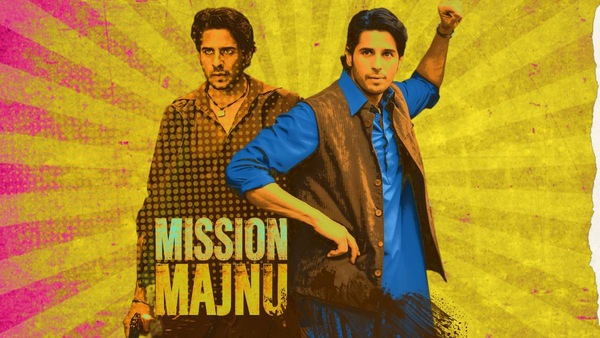Mission Majnu Is A Reminder Of Just How Good Raazi Was
And that's about all we can say to justify the existence of Sidharth Malhotra's limp spy drama.

Last Updated: 01.02 PM, Jan 20, 2023
This is #CriticalMargin, where Ishita Sengupta gets contemplative about new Hindi films and shows.
***
Mission Majnu is the kind of film that believes there is no irony in casting Sidharth Malhotra, a strikingly handsome actor, as a RAW agent — even when being unassuming is the professional mandate. It is also the kind of film that unreservedly extends the idea that in 1974 Pakistan was ruled by a group of people who looked comical and acted ridiculous. Nothing else explains why a Pakistani brigadier would reveal information as highly classified as the country making nuclear bombs to…wait for it…a tailor. Shantanu Bagchi’s spy drama is so witless in appeal and contrived in design, so bereft of logic that it seems to be conceptualised by a bored parent in an effort to put their child to sleep.
To say that Mission Majnu frames a whole feature length film around an intelligence officer while possessing the intellect of one-and-a-half brain cells is to put things mildly. Written by Parvez Shaikh, Aseem Arora and Sumit Bhateja, this limp spy drama is so tropey and univentive that the only purpose of its existence should be to remind us of the definitive accomplishment of Meghna Gulzar’s Raazi.
The outline is similar. Amandeep Ajitpal Singh (a perpetually amused Malhotra) is an undercover agent who is fated to be stranded at the crossroads of love and duty. Love for the woman he is with, and duty towards India. Bagchi’s directorial debut has none of the nuance of Gulzar’s 2018 film. To be fair, two films on a similar subject need not be the same. But Mission Majnu is not just different, it is infinitely inferior and an instance of horrid VFX and lazy writing.
Set in 1974, the narrative centers on the time India had conducted their first nuclear test at Pokhran and being apprehensive of the consequences, Pakistan covertly started making their own nuclear bomb. The story (apparently based on true events) is about an Indian spy who uncovered it while staying in the neighbouring country. But Mission Majnu chooses to convince us of his bravery and intellect through a series of uninspired coincidences and a very fake train fight. The problem is not that the odds never seem to be adequately stacked against the character but it is in the way he bypasses whatever little lies in his way.
Take for instance how his blind wife (a wasted Rashmika Mandanna) — whose character arc involves smiling throughout the film — just happens to mention European toilets one day and that gives Malhotra a clue about a foreign-returned man who might be involved in making the bomb. Or that a brigadier pours his heart out to him about confidential information. A turban magically arrives when he needs a disguise to hide from the police, a tunnel just surfaces when he is stuck at a fight. It is honestly alarming that it took three people to come up with this.
But I’d also argue that this is part of a larger problem. Mission Majnu is the latest addition to the expanding roster of Hindi films which assume that their intent to uphold saffron nationalism should make up for their lack of craft. Nothing else explains the troll-like tone of the voiceover (furnished by Parmeet Sethi playing the role of a RAW Chief) that exists to regurgitate the greatness of India. Like a rabid Indian cricket fan, he starts out by saying how Pakistan has never won a war against India, that its democracy is a hoax given that it is the army that pulls the strings. Words like “unstable” are freely used to describe the neighbouring nation and only lofty adjectives are reserved to define India. If this was not enough, Malhotra’s character is depicted as the son of a traitor. He, on the other hand, is a dedicated soldier of the land (his words, not mine). This detail exists to elevate that not all Hindus commit treason. That the antagonist is a nation and not an individual, purports to the reading that all Muslims do. I’d even say that the blindness of Mandanna’s character is an artless stand-in for the blindness of Pakistan.
Mission Majnu does not stop here, of course. It also goes ahead and glosses over India’s past. In one scene Malhotra says, “We don’t live on hate” adding that the country got freedom with love and peace. It’s a cute scene except it isn’t true. India’s independence was accompanied by the Partition, one of the most gruesome chapters in our history. He never mentions it of course, neither does the film. In another scene, he talks about the people who were kind to him while growing up after his father’s death. He remembers a Sikh man who helped him, a Christian father who aided his admission in school. This, he declares, is the India he loves. The country he can sacrifice his life for. I rewatched this moment twice to confirm that he did not, in fact, include any Muslim. If a spy’s idea of his secular country is so stilted and knowledge about its past so incomplete, there is something to be said about his (lack of) intelligence.
